Holds our Monthly Feature and Monthly Feature data
By Sr. Carol Breslin, MMM
On September 13, 2023, I travelled to New York City from our MMM house in Somerville to present our MMM story to the board of directors of UNANIMA International. UNANIMA International non-governmental organization with consultative status at the United Nation, representing 22 congregations of women religious, comprising 25,000 people in 85 countries. They advocate for those, especially women and children, who are homeless or displaced, migrants and refugees, victims of human trafficking, and those whose lives have been affected by climate change.
I had been delegated to do this to support our application for UNANIMA membership. Representatives of twenty-three other congregations of women religious would be voting on our request. No pressure! It was also an opportunity to meet these representatives in person as I began my work with the organization.
The three-day meeting was held at Thomas Berry Place, a conference and retreat center named for the Passionist priest and cultural historian who was at the forefront of much thinking about cosmology and world religions.
Ces Martin, a Sister of Notre Dame de Sion, president of the executive committee, chaired the sessions. After our opening prayer on Thursday, several women who were beginning their terms on the UNANIMA board and the new executive assistant were introduced and welcomed. I was also welcomed as representing a potential new member.
We then participated virtually in a parallel event prepared by UNANIMA International on the occasion of the 2023 UN SDG (Sustainable Development Goals) Summit. The theme was “Rethinking Multilateralism: Responding to Interconnected Crises from the Lens of the ‘People’ SDGs, Partnerships, and Civil Society”. We looked at some of the factors that interfere with countries working together to deal with common challenges. Rich countries sideline poorer countries in resource allocation and large corporations act without accountability in how they make profits. Government policies are often reactive in dealing with homelessness instead of looking at preventive measures, e.g. combatting violence against women and evictions. At the same time, civil society has had success in advocating for changes in policies and attitudes at a global level. There was a great emphasis on a collaborative approach, including religious groups.
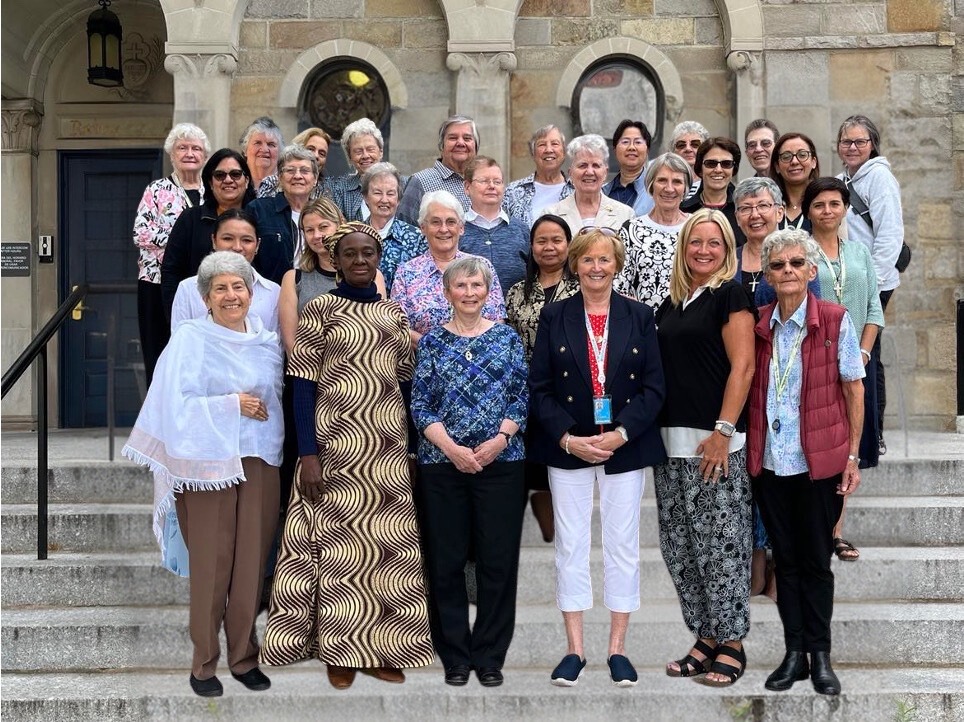
That afternoon, UNANIMA Executive Director Jean Quinn, a member of the Daughters of Wisdom, presented the annual report and answered questions. I then presented the MMM story to the group, beginning with a summary of Mother Mary’s life and inspiration. I spoke about our current membership and ministries, our emphasis on the health of mothers and children, and our involvement in emerging needs such as human trafficking, domestic violence, mental health, refugees, and the environment. I also talked about the work of our MMM Associates, and how we collaborate with them in living the healing charism in our daily lives.
While the vote was taken on our MMM membership I waited outside with two other non-voting participants. During an interesting conversation about our mutual work in Uganda, one of the women said had been a good friend of our late Sister Maura Lynch! Soon I was welcomed back into the meeting room to applause from the UNANIMA International Board. MMM was elected an official member of UNANIMA! We then listened to stories about the ministries of some of the other congregations before the meeting was closed for the day.
On Friday we participated in a Zoom session in which congregational leaders of UNANIMA members expressed their support for the future of the organization. They emphasized that UNANIMA International advocates priority issues for member congregations. After a group photo, the organization’s 2024 budget was presented and approved. Jean Quinn then gave us feedback on the recent High-Level Political Forum at the United Nations, at which governments reported on their progress towards the achievements of the SDGs. Unfortunately, progress is only at 15%, so we have a lot to do in terms of advocacy.
We voted for the recipient of this year’s Woman of Courage award. The award honors women from around the world who have exhibited exceptional courage and leadership to make a difference in their communities, especially for the betterment of the lives of women and children. We decided to give the 2023 award to Sister Brigid Arther, a Brigidine Sister who works with migrants and refugees in Australia. In 2000, she co-founded the Brigidine Asylum Seekers Project (BASP). Her passion to see the human dignity and rights of all people respected has compelled her to stand beside those who experience incredible hardship and vulnerability, especially refugees and asylum seekers. She has visited refugees and asylum seekers in detention, listened to their stories, and supported them in their applications for residency and citizenship. Upon their release from detention, she accompanied them as they began life in a new country away from family and familiar surroundings. Brigid has been a constant advocate for asylum seekers at their assessment and court hearings and has been the litigation guardian for minors. She has also worked with young people on climate justice.
On Saturday morning, we broke into committees: development, finance, communications, bylaws, regional, and an ad hoc committee in preparation for the World Social Summit. For the moment, I am on the bylaws committee, which will help me to become familiar with the policies and guidelines of UNANIMA International. Back in the larger group, the committees reported on their work during the previous year.
Then it was time to say goodbye to all the wonderful, committed women I had met. While the next in-person meeting will be in New York, in February 2024, in the meantime I will be doing my committee work virtually from Somerville – thanks to Zoom! The other committee members are based in Georgia and Wisconsin, not very close to each other.
Apart from the advantages of meeting in person, the February UNANIMA gathering coincides with the meeting of the Commission for Social Development (CsocD, which advises the UN Economic and Social Council and governments on a wide range of social policy issues. UNANIMA board members may attend some of the sessions.
By Sr. Prisca Ovat, MMM
First Published in Global Sisters Report, June 2023
Responding to God with creative fidelity, I left my home in Nigeria in 2013 to go to Kenya, trusting in the God of the missions to help me blossom wherever I was planted. Like the spring flower, I did bloom in my new home.
I am a sister of the Medical Missionaries of Mary, an international missionary congregation of religious women founded in 1937. As our website states, as a congregation, we work collaboratively with the communities we serve by creating unique medical, human and social services to help people in challenging circumstances. To meet these needs, we “are trained professionally in (holistic) medical, social and related services with a particular concern for women and children.”
Apart from medical services, some of our other projects address food insecurity by helping people create small gardens and do seed-sharing projects. We also combat gender inequality through empowerment programs like computer training, hairdressing, tailoring and crafts. Overcoming gender-based violence and human trafficking have been two of our major advocacy programs.
In recent years, we have focused much of our ministry with the people of Kibera, Kenya. Kibera, the largest urban slum in Kenya and one of the largest in Africa, is a neighbourhood on the outskirts of Nairobi. Gender inequality is especially evident in education. Teenage girls are forced into early marriages, so their “bride price,” given by the groom’s family, goes to educate the male children.
The practice also exposes girls to the risk of human trafficking. Many girls that come to us have been tricked with the promise of a better life from young men. This promise lasts until the young girl becomes pregnant, and the man disappears, never to be seen again. The situation becomes complex with the evident reality of teenage single motherhood and the surge of street children.
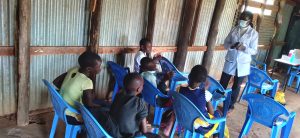
In the spirit of our charism, Sr. Liana de Jesus, a Medical Missionaries of Mary sister from Brazil, engages youth and teenage single mothers in skills acquisition — such as sewing, fabric designs and painting, bottle bricks, and wall painting. She shares her creativity with these enthusiastic young people who want to change the direction of their lives. The skills training is free, and the participants are empowered to set up small-scale businesses upon completing their training.
In Eldoret, another Kenyan city, Medical Missionaries of Mary sisters have been deeply engaged in health and medical services, targeting people experiencing poverty in the slums. As part of our healing charism, I worked in this mission, coordinating the medical outreach program. I accepted this responsibility with great enthusiasm, as I was unaware of the task ahead. It turned out to be more difficult than I had imagined, the most profound aspect being the palliative care unit. Every day of the week, I was working in the field of home-based care, listening to all the heartbreaking stories and keenly noting the devastating impact of poverty on the people. I soon established that every patient in the program suffered from one or more disabilities and needed total or supported care.
The healing charism is a broad concept that reshapes our understanding of disease and well-being. Beyond the physical and medical interventions, counselling appears time-consuming in an attempt to convince a patient that their well-being is their responsibility and our priority. Yet, such counselling or orientation is crucial. Determined to harness all our power to convince, we get the obstinate person off the street sometimes with a cup of porridge, especially when their health status has become a public health concern. That was the case of Moses, who recently completed his tuberculosis medications successfully, thanks to the availability of porridge and the power of words.
In the final analysis and evaluation, it appears that poor or inadequate health education can be a major root cause of noncommunicable diseases, thus contributing to fatalities within the communities. Responding to this threat, and because some chronic diseases have proven difficult to manage in underdeveloped areas and in settings of poverty, I have prioritised health education for volunteers who, in turn, teach the people about the prevalence of noncommunicable diseases in their locality; how to recognize the signs of each disease; and how to ask for help in a timely manner. We hope many of those we encounter can be helped to take responsibility for their own health.
Indeed, every success story is a challenge, but God has always shown the way as often as he wanted the work.
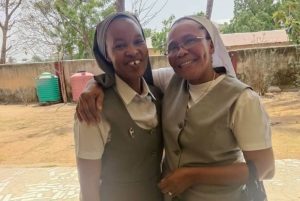 In June, the Global Sisters Report published an article about MMM Sisters in Fuka, Northern Nigeria. It was entitled “After violent attacks, Sisters of the Medical Missionaries of Mary in Nigeria launch mini clinic” and the journalist was Patrick Egwu.
In June, the Global Sisters Report published an article about MMM Sisters in Fuka, Northern Nigeria. It was entitled “After violent attacks, Sisters of the Medical Missionaries of Mary in Nigeria launch mini clinic” and the journalist was Patrick Egwu.
He interviewed Srs. Florence Njoka and Nancy Ong’era as they worked in their small rural clinic. Before the recent violent bandit attacks, MMM once ran a hospital in Munya, a local, government-administered community about 25 kilometres from the capital city of Niger, north-central Nigeria. This changed in 2021 after several bandit attacks in the area. MMM has been in the area since the 1980s, covering 16 villages and offering basic primary health care services. We run health education, and basic water, sanitation, and hygiene programmes. The focus is health and holistic healing for people from marginalised communities or areas with greater health needs.
Niger is one of the seven Nigerian states affected by the violent activities of heavily armed bandits and local gangs who attack villages, destroy farmlands and abduct for ransom. In the last few years, our MMM Sisters have found themselves entangled in a web of violent attacks by bandits. They have been living in fear and danger, unsure of what happens next. Niger State remains a safe haven for the bandits who abduct villagers and kill security personnel. Since the beginning of this year, dozens of locals have been killed by the bandits while more than 100 others have been abducted.
After fleeing their community and shutting down the hospital, the sisters started brainstorming on how to start another clinic to provide health services to residents. After consultation with the relevant authorities, they decided to focus on the important aspects of care that people needed the most, sickle cell anaemia and tuberculosis. The area has one of the highest number of cases of tuberculosis in Nigeria and the hospital run by the Sisters is one of the best treatment centres for the disease. Government hospitals sometimes rely on their facilities to collect relevant data on the disease. The Sisters decided to open a mini designated outreach clinic that will serve as a central location for people around the area who need basic health treatment, especially those who fled their communities because of attacks by the gunmen.
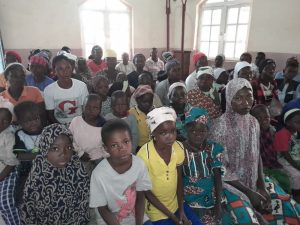
To make the new hospital work, the sisters went back to their hospital to get the essential equipment and supplies. They took lab equipment, generators, reagents, tables, and computers. From Monday to Thursday each week, the new clinic runs limited services, unlike the one they left behind in Munya. Fridays are reserved for restocking supplies.
Naturally the Sisters want to return to the main hospital. We want to go back”, they say. “When you look at families with little children and how they bounced back from attacks, that gives you the courage to carry on. They run after attacks and return the next day because that is the only home they have. They have nowhere else to go. So, you have to develop your own resilience to deal with trauma.”
By Patrick Egwu – Published in the Global Sisters Report – Read the full story at www.globalsistersreport.org/node/246951
By Sr. Maria Jose da Silva, MMM
During the last year, 2022, MMM in Salvador, Brazil, through the support of our donors overseas and with the local support of our lay people in the Pastoral Centre, was able to help about 100 women between the ages of 14-50 years old. These women come from our local parish and were referred to us by some of the local leaders.
We have tried to work with the most vulnerable and those in great need. We set up a dress-making course – among the group, there are some people who learn quickly, and they are very pleased when they are able to sew a dress or a skirt for themselves. One of these women caught my attention. She is Gloria Pereira dos Santos, 68 years old, and is a mother of two children; her daughter is a lawyer and her son is an engineer. Gloria herself is a social worker. When she was young, she had this dream and ambition to study and get her Bachelor as a Social Worker, as she wanted to work in this field, which she did for some time. Now she has retired from her work.
Gloria was married, but her husband became sick and died. She was a young widow and took on the responsibilty of educating her children. The neighbourhood where she lived her whole life is a place which is characterised by violence and drugs. She shared with me that one of her strong beliefs was to support her children to study and become professionals so that they could sustain themselves. She is very proud of herself because her children are all working and can now take on responsibility too. She is one of many women who take their lives seriously and fight for their values. It is encouraging to interact with someone very positive towards life and her environment. She really loves her neighbourhood and the friendship she established with others around where she lives has led to a positive engagement with others.
I was touched by her contagious energy of joy, because she learned how to sew and made a few dresses for herself, but I also noticed that her self-esteem increased and her interactions encouraged others to become more positive and work on their self-esteem. By sharing her story, she helps empower other women in the group and help them become natural leaders. This is the secret of empowerment that we offer in our ministries with the people. We are deeply grateful to our donors who have their mission connected with MMM in our different countries.
I asked her if her story could be shared so as to inspire other women, she accepted and was happy to share her positive message – and her dress-making skills!
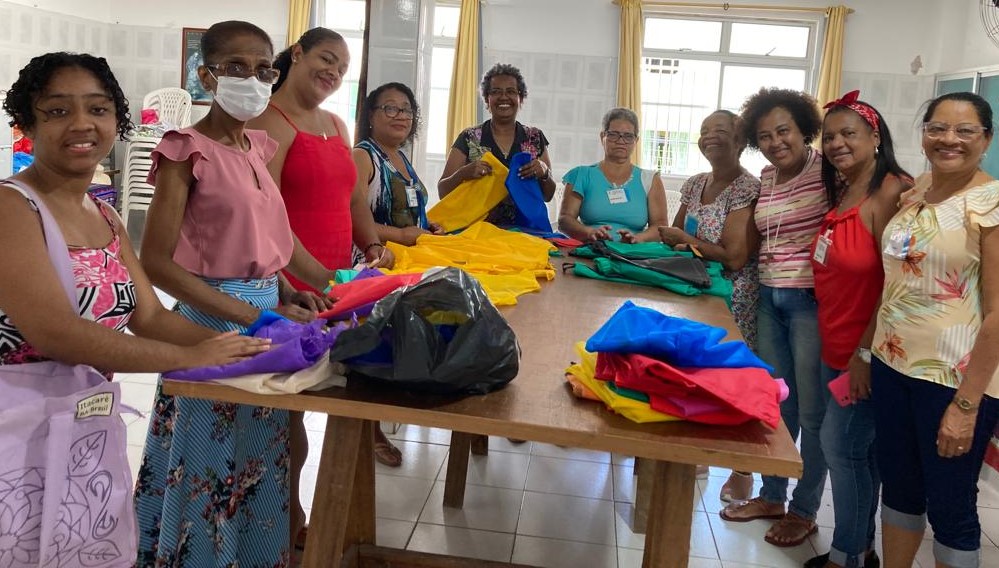
By Nadia Ramoutar, MMM Communications Coordinator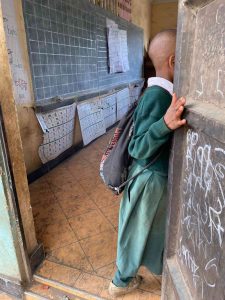
For many children in the Western World, having summer months off is an exciting time of freedom when they will enjoy fun activities, camps and even holidays overseas. It is a much welcomed break for children who worked hard all year at school and now can rest and enjoy their favourite activities, including video games, TVs, mobile phones and tablets. Parents can schedule time off from work and bring the school age children to different places.
For the children in many of our MMM school age projects in Africa and Brazil, taking time off from school is not the celebration it is in other parts of the world.
For one thing, many of the children in our programmes receive their main meal of the day in school, and sometimes it is the only meal of the day. It is hard for many of us, think how difficult learning must be for a child who has had no breakfast and will have no dinner. Many of the children walk long distances to get to school which means they are burning off calories that they did not consume.
The Faraja Centre in Singida, Tanzania run a school programme for vulnerable children. The children are entered into the programme through various types of referral. Some have HIV or are being raised by parents or grandparents with HIV. Some are children of chronically sick, terminally ill or deceased parents. The world is very harsh for these children.
The Principal of one of the schools, Juma J. Thomas is very grateful to the MMM’s Vulnerable Children Project because it helps children who might otherwise stop coming to school for a variety of reasons, including not being able to afford uniforms or fees, also many vulnerable children are forced into work at a very early age. Some of the teenagers look very small for their age and at 17 years of age, some look like they are still in primary or elementary school due to malnutrition.
“There is no failing here”, the headmaster says expressing how much he cares about the 1.063 children in the secondary school. Despite his devoted attitude, he admits that the conditions for success are not there for many children who face enormous issues around poverty at home. He also faces a severe lack of resources at the school. He is both the chemistry teacher and the Headmaster because there is a shortage of teachers. He also has a shortage of books. There are only nine computers in the school for all 1,063 students, teachers and staff.
Despite the hardships in the school, the children are learning there and most importantly they are fed. Our MMM Programme in the school gives the children promise for a better future to break the intergenerational chains of poverty.
By Sr. Charity Munonye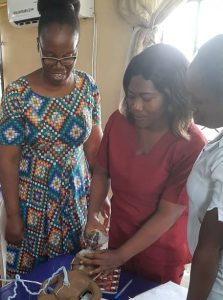
Located in Ebonyi State, southeast Nigeria, St. Patrick Hospital also known as Mile Four, was established in 1946 and managed by the MMM. It was founded to detect, treat and eradicate Hansen’s disease also known as Leprosy. The Hospital serves severely low-income people with high levels of illiteracy. The area has also seen an increase in insurgency and many IDPs (internally displaced people) live amongst the community due to camps being attacked. The combination of poverty, illiteracy, political unrest and the remoteness of the area make health a life-challenging issue for the local children and adults who struggle with a complete lack of resources.
There is a maternity unit in the hospital that was established in 1966 and today includes 70 maternity beds, 32 Paediatric beds and 20 nursery cots. It is a specialist referral centre for many child and mother issues. There are also outreach services and mobile clinics run from the hospital providing a wide range of preventative, palliative care, education, health, hygiene and gender/safeguarding issues. The people in the area face major challenges to health and the services provided seek to help the people learn how to improve their quality of life on several different fronts that they would otherwise not experience.
Due to preventative health programmes and health services, the area is seeing outstanding improvements in many aspects of well-being. Our good news includes a major decrease in infant mortality rates. Improved equipment purchased with the funding of Misean Cara (MC) and the increase in community health training programmes means that people can be treated locally and not sent off to far distances. There have been many challenges in the hospital that are being overcome in a positive way due to the increase in funding and training. All of this allows us to create an increased quality of life in the community for school children, expectant and new mothers through a wide variety of additional resources.
The Hospital recently underwent a review for funding that identified several major improvements on key markers for health in the community. This shows exciting progress. Now that we go to more schools, our networking with different school authorities is increasing and they appreciate our services. Our active collaboration with the Ministry of Health includes provision of vaccines, training, and monitoring of our services against set standards, retraining of our professional staff to cope with modern trends and data validation. Our staff training has empowered our employees to save more lives and to help more people in need.
By Sr. Dumka Michael, MMM
The Cardinal Onaiyekan Foundation for Peace, in collaboration with The Medical Missionaries of Mary PHC clinic and maternity, Aco Estate, New Lugbe Airport Road, Abuja held a 2-day workshop and training on peaceful coexistence themed “strengthening peaceful coexistence through enhancing the economic capacity of Sauka women”. The event took place in Zhigbodo Sauka Village of Kuje Area Council from the 16th to 17th of January 2023 and was convened by Sr. Dumka Michael, MMM.
The project target is to solve the issue of hunger being caused by the heightened incessant insecurity and this has in turn inhibited the crop harvested in the community. The fear of going to the farm due to insecurity has also increased food scarcity in the community. And as stated by the Village Chief, hunger is unbearable as it triggers quarrelling and fighting among members.
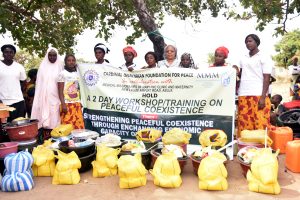
As women are the backbone of the family, they would love to be financially stable to support their families, hence the need for this project among the Zhigbodo Community. It will help seek out alternative ways and provide the skills required for a better understanding of the complexity of this problem.
The economic empowerment program was targeted to enhance the economic value and skills of the Sauka women to make their impact in the community formidable, while also educating them on the role they play as peace enablers.
The Project empowered 23 women (7 women with materials each to be able to make Ghana soap, liquid soap and izal; 3 women farmers for groundnut farming with 70 mudus of shelled groundnuts each; 1 woman with 20 mudus of soya-beans and other materials for making awara; 1 woman with 20 mudus of groundnuts and other materials for kuli-kuli (groundnut cake) making, 1 woman with a female goat, 9 women with materials each for the making of chin-chin and puff-puff and 1 woman with a sewing machine).
The project climaxed with the training of the women on how to use their empowerment materials to make various things such as puff-puff, chin-chin, izal, liquid soap, kuli-kuli, awara, and clothes etc for economic gain to solve their family needs. The women were also educated on the importance of home management, basic business skills and personal hygiene.
We learned that the community were fully aware of their importance and roles in society not minding their financial status, they were all excited about the visit and hoped for a positive outcome, and they were equally eager and ready to learn new skills or innovations.
The Medical Missionaries of Mary hope to maintain a continuous collaboration with the Zhigbodo people and encourage them in all their activities. They also seek to create more collaboration with other NGOs or institutions within and outside FCT-Abuja that have the same common interest for partnership.
By Sr. Maria José, MMM
The Anna Sironi Centre is a pastoral work of the parish where the MMM Sisters live in Salvador, Brazil. Many Sisters have collaborated or led their activities over the years and recently Sr.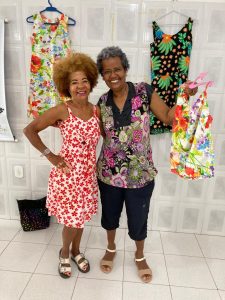 Maria José , MMM, “listened in” to a conversation among three of the leaders of the Centre, Ana Castro, Maria Helena Ramos Belos and Ednalva de Jesus.
Maria José , MMM, “listened in” to a conversation among three of the leaders of the Centre, Ana Castro, Maria Helena Ramos Belos and Ednalva de Jesus.
Ana Castro: What difference do you think our work here has made to the local women?
Ednalva: Definitely we have empowered these women in so many ways. I would begin with self-esteem. At home, many women do not have a voice. No one listens to them and yet they are the ones who carry the burden of raising the children – and get the blame if things turn out badly.
Helena: We have also helped in practical ways. As you say, often it falls to the woman to be the breadwinner of the family, but they have had little chance of education and no training or skills. When we teach dressmaking, cooking and literacy – all these allow the women to have a small income in their own right. It allows some women to escape situations of domestic violence.
Ednalva: What I love is seeing the women grow in self-confidence. When they come first, they are often very quiet and do not participate in group discussions, but as time goes on, they realize that many women are in similar situations as themselves and they begin to share more and explore opportunities for change. They begin to take a stand in our discussions and debates. They get involved in some activities in the parish and believe that they can change their life story through interaction with other women.
Ana Castro: Isn’t it great to see these women becoming our new leaders? I notice how they can lead the discussions now, and I really love the way they are learning to share the joys and sufferings as we pray together before we start the sessions. I strongly believe in the healing presence of Christ when they can share joy and pain with each other.
Helena: I have also noticed how their health has improved. I suppose self-esteem encourages women to look after their health needs.
Ana Castro: What motivates me to do this work started more than 10 years ago when I retired. I came to help MMM at the Project Consolação. There the women came to share their losses and grief of losing a son through violence. In fact, I was helped by this experience. I confess that I became a different person, inserted in the current reality, and became more passionate in this work with women. That’s why, even with the end of the Project, I still feel committed to these women.
Ednalva: For me, it is all about listening. I have learned with this work to develop my empathy and sensitivity to the suffering of each woman as they come to the center for the activities. I can offer my ear and presence for deep listening, and rely on my faith that God is always present. He does His work through me. I am trying to be a presence of love and compassion. Their stories mingle with my own.
Sr. Maria José: What have you learned from MMM over the years?
Ana Castro: I have learned to experience the Visitation like Mary and Elizabeth. This happens while I am visiting and know the joy of listening to people in their homes. I experience God’s presence with the families. I am filled with gratitude for MMM, for the opportunity to learn to listen, share knowledge, be more present with the people of God, especially the poor.
Helena: In my interaction with MMM I was able to discover my abilities, skills and capabilities through the various opportunities offered to participate in training courses and meetings for the improvement of health care and listening. My faith was also strengthened. I also became more pastorally active. Sister Úrsula Cott, a special friend, invited me to participate in HIV/Aids Pastoral ministry and I am part of this pastoral ministry up to today, as coordinator here in the Archdiocese of São Salvador da Bahia.
Ednalva: Maria José, I just want to tell you how grateful we are to MMM. You have done a lot for us women here in Nordeste de Amaralina, our little part of the periphery of the city of Salvador. The Sisters have given me strength and helped me develop. Thank you for everything. May God bless you and enlighten your lives in your missionary journeys. May Mother Mary be a strong presence in the mission of each one of you. May she bring encouragement and nourishment to your missionary dreams every day.
By Sr Mary O’Malley, MMM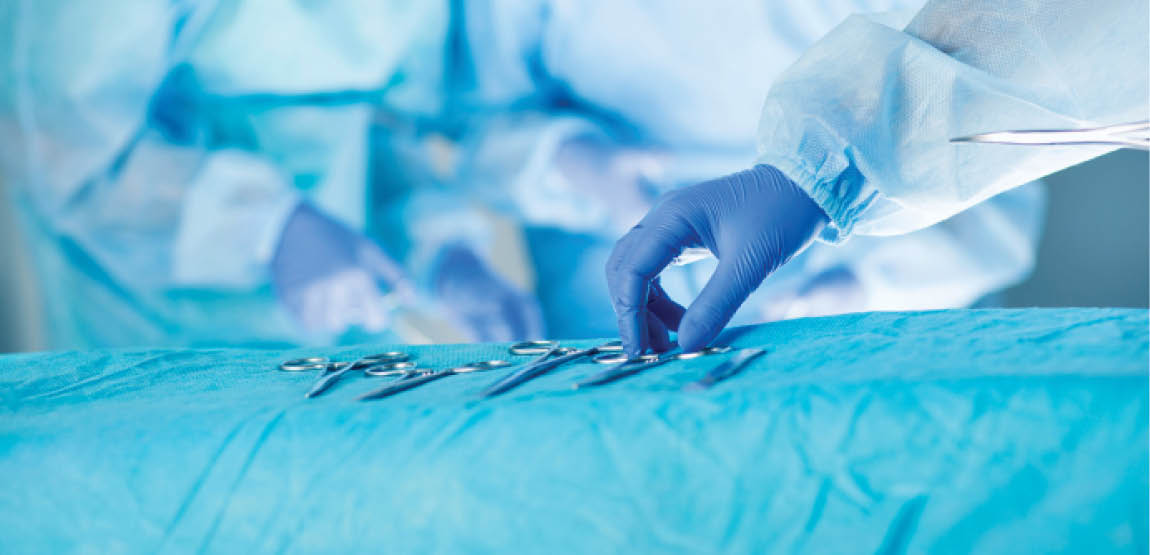
We are convinced that since Nairobi is a Mecca for expatriates of surrounding countries and the whole of East and Central Africa, we experience the full ‘fall-out’ of the problem of Human Trafficking here.
An example is the case of a Ugandan nurse (‘Lucy’) hired here in Kenya to care for an elderly lady. She was raped by one of the sons of the family and became pregnant. Her husband was an army man and was killed in Iraq when her youngest child was six months old. This child was six when Lucy decided to take a job in Nairobi. But the rape brought her untold pain and we were at the receiving end of caring for her from 11th February – mid-July, 2022. She had three major complications of pregnancy and one of these entailed delivery by caesarean section. The others were high blood pressure and anemia which are also obstetric nightmares. She did not wish to arrive home to Uganda while pregnant and we respected her wishes. In mid-April, while all this was happening, she received news that her mother had died (a diabetic with high blood pressure). She was also caring for her other two children aged 6 and 8. Due to the obstetric complications she could not travel, but we linked her in to follow the funeral Mass and burial online. She had a friend take the children to a primary boarding school but that entailed an expense from our side.
Lucy had her caesarean section in the Kenyatta National Hospital (KNH) but one week later it was complicated by a huge abdominal abscess which necessitated a return to the operating theatre. Later the baby was admitted to hospital with neonatal pneumonia. Slowly Lucy gained strength and healing and her thoughts turned to home. The now ten-week-old baby girl had gained good weight and would soon join her siblings in the Southwest corner of Uganda. We thanked God for such a good outcome despite the many hurdles we faced together with Lucy.
From MMM Mukuru Health Program
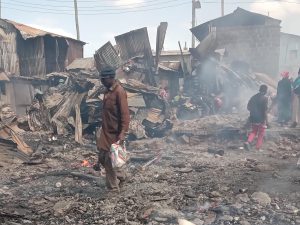 It was the morning of 14th March 2023 at 10 am, at the time when the staff of Mukuru Health Program were engaged in the healing services, that a fire broke out in a place called Vietnam
It was the morning of 14th March 2023 at 10 am, at the time when the staff of Mukuru Health Program were engaged in the healing services, that a fire broke out in a place called Vietnam
in Mukuru slum. Vietnam is among the 8 villages that make Mukuru slums and it’s about 200m from our facility and adjacent to the nearby Parish church that is run by the Holy Ghost Fathers. It was the security man, of Mukuru Health Program, who alerted others that there was unusually thick smoke in the neighbourhood. A few staff ran to find out what was happening and then one of them came back with the news of fire that was gushing through the iron sheet houses. It was without a known cause and most of the residents had gone off for their usual casual labour.
It was a relief when the firefighter task force finally came in and managed to put the fire out after almost two hours. The task was made difficult due to the lack of a passable road to access the area of fire and the presence of gas cylinders that residents used in cooking, kept exploding, igniting more fire which was spreading very fast to other houses!
One of the women from the same place had come to the health centre that morning with severe abdominal pain. She was given some medication to relieve the pain as samples were taken to the laboratory. The triage nurse put her into the observation room to rest while waiting for results from the laboratory tests. She was later seen by the clinician with the laboratory results and put on medication to go home with. Upon getting the medication, she went home, to find her house with all her belongings already burnt! She came back to the facility confused, almost fainting and the words on her lips were “I have nothing left! “I have nothing left!” The staff rushed her to the emergency room to calm down. Thank God for the medical team that resuscitated her. Later the counsellor gave her psychological care. This was also extended to her husband and son, who came to the health facility. As if that was not enough, a group of youths came rushing with a fellow youth, holding his profusely bleeding hand. He had been trapped inside a room and he escaped by breaking the window, using his hand but it sliced his palm and fingers. He was attended to urgently, to arrest the bleeding, suturing and treatment were done for free! Fortunately, the Government ambulance was at the scene to take any other casualty to the nearby Government health facility.
It was sad to note that after the fire died down, people started looting and stealing the property that the affected people had rescued, while the police officers were looking on! This left us wondering, was it because they could not honestly identify the rightful owners! Nevertheless before we left duty, that evening, we visited the affected families and they were gathering all they could get from the rubble, children, women, youth and men alike. They were all in it together, it seemed nothing mattered whether religion, tribe or political affiliation, they were all united in what had come their way. There was a sense that they understood the value of being interconnected during this disaster.
Approximately, five hundred households were affected by the fire, leaving about 1100 people internally displaced (IDP) and hopeless. The majority of the IDPs were women and their children who lost everything including their important documents. These people need a place to stay, psychological support, provision of essential items like mattresses, blankets, dignity packs like sanitary towels, soap, tissue and toiletries in general. There is an urgent need for medical care to ensure that the clients that are on lifelong medication are offered a refill since their drugs were burnt down. We partnered with the Government facilities close by to ensure that the affected get the necessary care.
Currently in Kenya, the rains have started, thus the survivors are prone to infection like colds, therefore they need clothing support and warm sweaters to help protect them from more trouble.
In conclusion, disasters of fire and floods are very common in Mukuru slums, just like most informal settlements. Therefore the call to empower the already existing task force, that is, selected people in the community on immediate response to fire and flood, so that a quick intervention will be ensured to prevent more damage.
